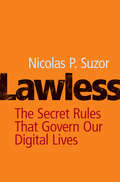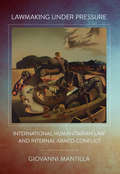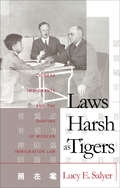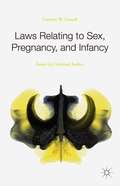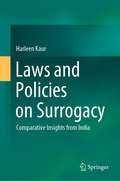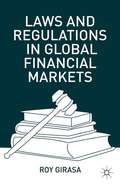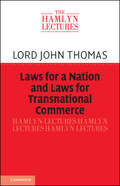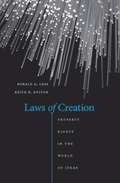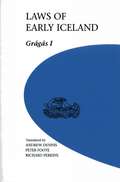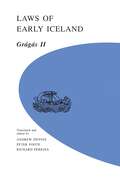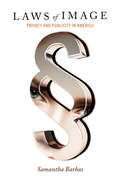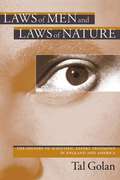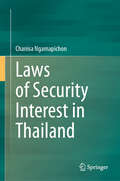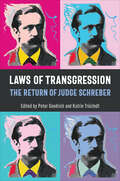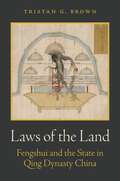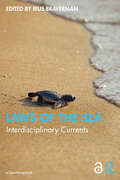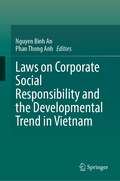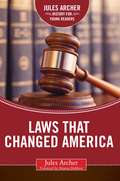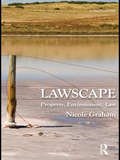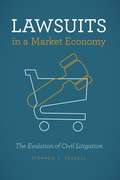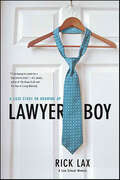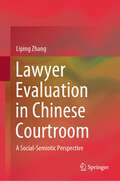- Table View
- List View
Lawless: The Secret Rules That Govern Our Digital Lives
by Nicolas P. SuzorRampant abuse, hate speech, censorship, bias, and disinformation - our Internet has problems. It is governed by technology companies - search engines, social media platforms, and infrastructure providers - whose hidden rules influence what we are allowed to see and say. In Lawless, Nicolas P. Suzor presents gripping examples of exactly how tech companies govern our digital environment and how they bend to pressure from governments and other powerful actors to censor and control the flow of information online. We are at a constitutional moment - an opportunity to rethink the basic rules of how the Internet is governed. Suzor offers a vision of a vibrant, diverse, and flourishing internet that can protect our fundamental rights from the lawless rule of tech. The culmination of more than ten years of original research, this groundbreaking work should be read by anyone who cares about the internet and the future of our shared social spaces.
Lawmaking under Pressure: International Humanitarian Law and Internal Armed Conflict
by Giovanni MantillaIn Lawmaking under Pressure, Giovanni Mantilla analyzes the origins and development of the international humanitarian treaty rules that now exist to regulate internal armed conflict. Until well into the twentieth century, states allowed atrocious violence as an acceptable product of internal conflict. Why have states created international laws to control internal armed conflict? Why did states compromise their national security by accepting these international humanitarian constraints? Why did they create these rules at improbable moments, as European empires cracked, freedom fighters emerged, and fears of communist rebellion spread? Mantilla explores the global politics and diplomatic dynamics that led to the creation of such laws in 1949 and in the 1970s.By the 1949 Diplomatic Conference that revised the Geneva Conventions, most countries supported legislation committing states and rebels to humane principles of wartime behavior and to the avoidance of abhorrent atrocities, including torture and the murder of non-combatants. However, for decades, states had long refused to codify similar regulations concerning violence within their own borders. Diplomatic conferences in Geneva twice channeled humanitarian attitudes alongside Cold War and decolonization politics, even compelling reluctant European empires Britain and France to accept them. Lawmaking under Pressure documents the tense politics behind the making of humanitarian laws that have become touchstones of the contemporary international normative order.Mantilla not only explains the pressures that resulted in constraints on national sovereignty but also uncovers the fascinating international politics of shame, status, and hypocrisy that helped to produce the humanitarian rules now governing internal conflict.
Laws Harsh As Tigers
by Lucy E. SalyerFocusing primarily on the exclusion of the Chinese, Lucy Salyer analyzes the popular and legal debates surrounding immigration law and its enforcement during the height of nativist sentiment in the early twentieth century. She argues that the struggles between Chinese immigrants, U.S. government officials, and the lower federal courts that took place around the turn of the century established fundamental principles that continue to dominate immigration law today and make it unique among branches of American law. By establishing the centrality of the Chinese to immigration policy, Salyer also integrates the history of Asian immigrants on the West Coast with that of European immigrants in the East.Salyer demonstrates that Chinese immigrants and Chinese Americans mounted sophisticated and often-successful legal challenges to the enforcement of exclusionary immigration policies. Ironically, their persistent litigation contributed to the development of legal doctrines that gave the Bureau of Immigration increasing power to counteract resistance. Indeed, by 1924, immigration law had begun to diverge from constitutional norms, and the Bureau of Immigration had emerged as an exceptionally powerful organization, free from many of the constraints imposed upon other government agencies.
Laws Relating to Sex, Pregnancy, and Infancy
by Carmen M. CusackLaws Relating to Sex, Pregnancy, and Infancy examines case law and legislation in regards to reproduction, pregnancy, and infancy. Cusack explores the winding pathways of legal precedence and action on the social conditions of pregnancy and childbirth, and draws from criminal and court procedures and behavioral science to determine if the law is acting in the best interest of those vulnerable populations. Cusack surveys interpersonal, familial, and societal problems presented throughout history and currently facing contemporary generations, questioning whether the criminal justice system can evolve to support the growing needs of its citizens most in need of legal assistance.
Laws and Policies on Surrogacy: Comparative Insights from India
by Harleen KaurThis book is an essential guide on surrogacy, discussing various legal issues that arise in surrogacy cases. It provides a comprehensive coverage to various issues pertaining to surrogacy arrangements due to failure to meet the needs of those involved in surrogacy, be it the intended parents or the surrogate mother, with special emphasis on the most vulnerable party -- the surrogate child. In the wake of this existing imbalance, the call to reform the practice of surrogacy has also increased. The book provides a comprehensive coverage to various laws and policy regulations in existence dealing with surrogacy, and unravels the latest trends and developments happening around the world as surrogacy gains importance. The international perspectives highlight policies and practices being adopted and followed by various nations with regard to surrogacy regulation and associated parenthood rules. This book also analyses some of the significant cross-border disputes revolving around surrogacy, and explores briefly the jurisprudence of the European Court of Human Rights on matters of parentage and citizenship for children born of trans-national surrogacy with special reference to the prospects of a convention on international surrogacy currently being studied by The Hague Conference on Private International Law. Further, it highlights the issues and questions relating to surrogacy arrangements that are so far unresolved and unanswered and suggests measures for improvements to the existing proposed surrogacy legislation in India and need for uniform international regulation. The book is a great resource for legal practitioners, academics, students, policy-makers, infertility clinics, and charitable organizations working on this issue.
Laws and Regulations in Global Financial Markets
by Roy GirasaThe major financial scandals of the past decade, which have been discussed exhaustively in corporate offices by corporate attorneys, and in accounting firms, have led to the passage of massive Congressional enactments in the United States that impact the world of finance. The enactment of the Sarbanes-Oxley Act in 2002, with its significant provisions of 20-year imprisonment for certain offenses, and the conviction of Enron's CEO and other senior executives, finally caught the attention of corporate executives. Laws and Regulations in Global Financial Markets presents students, researchers, and practitioners with an in-depth global analysis of the legal and regulative aspects of corporate financial markets. Readers are introduced to international developments concerning rules and regulations impacting investment advisers and broker-dealers, bankruptcy law, important legal changes influencing banks and credit ratings organizations, real estate regulations, and insurance law. The book concludes with a discussion of personal finance, financial literacy, and federal statutes centered around the subject matter.
Laws for a Nation and Laws for Transnational Commerce (The Hamlyn Lectures)
by John ThomasIn the 75th Hamlyn Lectures, former Lord Chief Justice of England and Wales Lord Thomas examines Welsh law and the law used for transnational commerce to assess what laws are best national in their application and which are best transnational. He first argues that Wales as a nation should be able to make its own laws on the basis of clear principles and sets out possible solutions to the issues raised by the devolution of law-making powers in 1999. He then explains the success of English commercial law in attaining transnational use and examines the emergence of transnational law from the late nineteenth century. At a time of unprecedented change and competition, his analysis of the present position of the use of English law for transnational commerce and the challenges it faces provides the essential context for a series of practical options for its continued use in the future.
Laws in Conflict: A Mystery of Medieval Ireland (Burren Mysteries #8)
by Cora Harrison"Harrison, like Peter Tremayne in his Sister Fidelma series, provides a superior brand of historical mystery" Booklist. February, 1512. Mara, Brehon of the Burren, judge and lawgiver, has been invited to the magnificent city state of Galway, which is ruled by English laws and a royal charter originally granted by Richard III. Mara wonders whether she can use her legal knowledge to save the life of a man from the Burren who has been caught stealing a meat pie, but events soon take an even more dramatic turn when the mayor's son is charged with a heinous crime. Sure there is more to the case than meets the eye, Mara investigates ...
Laws of Creation: Property Rights in the World of Ideas
by Ronald A. Cass Keith N. HyltonWhile innovative ideas and creative works increasingly drive economic success, the historic approach to encouraging innovation and creativity by granting property rights has come under attack by a growing number of legal theorists and technologists. In Laws of Creation, Ronald Cass and Keith Hylton take on these critics with a vigorous defense of intellectual property law. The authors look closely at the IP doctrines that have been developed over many years in patent, copyright, trademark, and trade secret law. In each area, legislatures and courts have weighed the benefits that come from preserving incentives to innovate against the costs of granting innovators a degree of control over specific markets. Over time, the authors show, a set of rules has emerged that supports wealth-creating innovation while generally avoiding overly expansive, growth-retarding licensing regimes. These rules are now under pressure from detractors who claim that changing technology undermines the case for intellectual property rights. But Cass and Hylton explain how technological advances only strengthen that case. In their view, the easier it becomes to copy innovations, the harder to detect copies and to stop copying, the greater the disincentive to invest time and money in inventions and creative works. The authors argue convincingly that intellectual property laws help create a society that is wealthier and inspires more innovation than those of alternative legal systems. Ignoring the social value of intellectual property rights and making what others create and nurture “free” would be a costly mistake indeed.
Laws of Early Iceland: Gragas I
by Andrew Dennis Peter Foote Richard PerkinsThe laws of Medieval Iceland provide detailed and fascinating insight into the society that produced the Icelandic sagas. Known collectively as Gragas (Greygoose), this great legal code offers a wealth of information about early European legal systems and the society of the Middles Ages. This first translation of Gragas is in two volumes.
Laws of Early Iceland: Gragas II (U of M Icelandic Series #4)
by Andrew Dennis Peter Foote Richard PerkinsThe laws of Mediaeval Iceland provide detailed and fascinating insight into the society that produced the Icelandic sagas. Known collectively as Gragas (Greygoose), this great legal code offers a wealth of information about early European legal systems and the society of the Middles Ages. This first translation of Gragas is in two volumes.
Laws of Image: Privacy and Publicity in America
by Samantha BarbasAmericans have long been obsessed with their images--their looks, public personas, and the impressions they make. This preoccupation has left its mark on the law. The twentieth century saw the creation of laws that protect your right to control your public image, to defend your image, and to feel good about your image and public presentation of self. These include the legal actions against invasion of privacy, libel, and intentional infliction of emotional distress. With these laws came the phenomenon of "personal image litigation"--individuals suing to vindicate their image rights. Laws of Image tells the story of how Americans came to use the law to protect and manage their images, feelings, and reputations. In this social, cultural, and legal history, Samantha Barbas ties the development of personal image law to the self-consciousness and image-consciousness that has become endemic in our media-saturated culture of celebrity and consumerism, where people see their identities as intertwined with their public images. The laws of image are the expression of a people who have become so publicity-conscious and self-focused that they believe they have a right to control their images--to manage and spin them like actors, politicians, and rock stars.
Laws of Medicine: Core Legal Aspects for the Healthcare Professional
by Amirala S. PashaThis book provides an overview of the US laws that affect clinical practice for healthcare professionals with no legal background.Divided into thirteen sections, each chapter starts with a summary of the chapter’s content and relevant legal concepts in bullet points before discussing the topics in detail. An application section is provided in many chapters to clarify essential issues by reflecting on clinically relevant case law or clinical vignette(s). Filling a crucial gap in the literature, this comprehensive guide gives healthcare professionals an understanding or a starting point to legal aspects of healthcare.
Laws of Men and Laws of Nature: The History of Scientific Expert Testimony in England and America
by Tal GolanAre scientific expert witnesses partisans, or spokesmen for objective science? This ambiguity has troubled the relations between scientists and the legal system for more than 200 years. Modern expert testimony first appeared in the late eighteenth century, and while its use steadily increased throughout the nineteenth century, in cases involving everything from patents to X-rays, the respect paid to it steadily declined, inside and outside of the courtroom. With deep learning and wry humor, Tal Golan tells stories of courtroom drama and confusion and media jeering on both sides of the Atlantic, until the start of the twenty-first century, as the courts still search for ways that will allow them to distinguish between good and bad science.
Laws of Security Interest in Thailand
by Chanisa NgamapichonThis textbook addresses several key disciplines, with a primary focus on commercial law, particularly the legal principles governing security interest in Thailand. It also delves into security interest, offering in-depth insights into the formation, enforcement, and interpretation of contracts. A significant portion is dedicated to security interest law, specifically within the context of Thailand, examining the legal frameworks that govern security interest. Additionally, the book touches on legal practice and professional development, providing valuable guidance for both aspiring and experienced legal professionals. Lastly, it explores business and corporate law, offering a broader understanding of how security interest interacts within business environments. Together, these disciplines provide a comprehensive perspective on the legal aspects of commercial agreements and security interests. Whether one is an aspiring attorney, an experienced practitioner, or simply an individual with an interest in the foundational principles of contract law, this guide offers valuable insights from a legal perspective.
Laws of Transgression: The Return of Judge Schreber
by Peter Goodrich Katrin TrüstedtLaws of Transgression offers multiple perspectives on the story of Daniel Paul Schreber (1842–1911), a chamber president of the German Supreme Court who was institutionalized after claiming God had communicated with him, desiring to make him into a woman. Schreber was not only a successful judge, but was also to become the author of one of the most commented upon texts in psychiatric literature, Memoirs of My Nervous Illness. Published in 1903, this remarkable work documented Schreber’s visions, desires, jurisprudence, and theology. Far from ending the judge’s legal investments, it manifested an intensification of engagement with the law in the attempt to prove that becoming a woman did not deprive the judge of legal competence. Schreber’s experience of bodily change and his account of interior life has been the subject of more than a century of psychoanalytic and medical scrutiny. With the contemporary trans turn, interest in the judge’s desire to become a woman has intensified. In Laws of Transgression, Peter Goodrich, Katrin Trüstedt, and contributing authors set out to unfold Schreber’s complex relation to the law. The collection revisits and rediscovers the Memoirs, not only in its juridical and political implications, but as a transgressional text that has challenged law and heteronormativity.
Laws of the Land: Fengshui and the State in Qing Dynasty China
by Tristan G. BrownA groundbreaking history of fengshui&’s roles in public life and law during China&’s last imperial dynastyToday the term fengshui, which literally means &“wind and water,&” is recognized around the world. Yet few know exactly what it means, let alone its fascinating history. In Laws of the Land, Tristan Brown tells the story of the important roles—especially legal ones—played by fengshui in Chinese society during China&’s last imperial dynasty, the Manchu Qing (1644–1912).Employing archives from Mainland China and Taiwan that have only recently become available, this is the first book to document fengshui&’s invocations in Chinese law during the Qing dynasty. Facing a growing population, dwindling natural resources, and an overburdened rural government, judicial administrators across China grappled with disputes and petitions about fengshui in their efforts to sustain forestry, farming, mining, and city planning. Laws of the Land offers a radically new interpretation of these legal arrangements: they worked. An intelligent, considered, and sustained engagement with fengshui on the ground helped the imperial state keep the peace and maintain its legitimacy, especially during the increasingly turbulent decades of the nineteenth century. As the century came to an end, contentious debates over industrialization swept across the bureaucracy, with fengshui invoked by officials and scholars opposed to the establishment of railways, telegraphs, and foreign-owned mines.Demonstrating that the only way to understand those debates and their profound stakes is to grasp fengshui&’s longstanding roles in Chinese public life, Laws of the Land rethinks key issues in the history of Chinese law, politics, science, religion, and economics.
Laws of the Sea: Interdisciplinary Currents
by Irus BravermanLaws of the Sea assembles scholars from law, geography, anthropology, and environmental humanities to consider the possibilities of a critical ocean approach in legal studies. Unlike the United Nations’ monumental Convention on the Law of the Sea, which imagines one comprehensive constitutional framework for governing the ocean, Laws of the Sea approaches oceanic law in plural and dynamic ways. Critically engaging contemporary concerns about the fate of the ocean, the collection’s twelve chapters range from hydrothermal vents through the continental shelf and marine genetic resources to coastal communities in France, Sweden, Florida, and Indonesia. Documenting the longstanding binary of land and sea, the chapters pose a fundamental challenge to European law’s “terracentrism” and its pervasive influence on juridical modes of knowing and making the world. Together, the chapters ask: is contemporary Eurocentric law—and international law in particular—capable of moving away from its capitalist and colonial legacies, established through myriad oceanic abstractions and classifications, toward more amphibious legalities? Laws of the Sea will appeal to legal scholars, geographers, anthropologists, cultural and political theorists, as well as scholars in the environmental humanities, political ecology, ocean studies, and animal studies.
Laws on Corporate Social Responsibility and the Developmental Trend in Vietnam
by Nguyen Binh An Phan Thong AnhThis book examines the law and its development trends in the area of corporate social responsibility (CSR) in Vietnam. It is an important reference in implementing the requirements of CPTPP and EVFTA in Vietnam, and it is also very important in improving the legal framework in Vietnam to comply with international standards, especially in the areas of labor, environment and consumer protection, and in raising awareness of CSR among Vietnamese companies. Many articles in this book analyze and assess the legal status of CSR, thus providing a number of constructive suggestions for improving the relevant laws in Vietnam. Corporate social responsibility is not only the contribution of corporate philanthropy to society, but also the compliance of companies with international standards and national laws in the fields of labor, environment, investment, labor security, social security, etc. Against the backdrop of Vietnam's growing international integration, the requirement of corporate social responsibility has been, and continues to be, paramount in business activities. It is not only a need at the enterprise level, but is also related to the internationalization of international standards and the improvement of national laws on CSR.
Laws that Changed America
by Jules Archer Brianna DuMontJules Archer begins with laws that opened up America—public lands and homesteading—and continues with banking, the Bill of Rights, subversion and sedition, foreign policy. Natural resources, labor, business, education and welfare, farming, Prohibition, the New Deal, the draft and G. I. Bills, slavery and civil rights. Archer chronicles the history of laws in America.Each chapter opens with a dramatic incident, and then develops the laws relating to it. Brisk up-to-date, authoritative, informative—this volume will be valuable a supplementary reading in the classroom, as well as a welcome addition to libraries across the country. Readers of all ages will find this an exciting approach to what is usually considered difficult material.
Lawscape: Property, Environment, Law
by Nicole GrahamLawscape: Property, Environment, Law considers the ways in which property law transforms both natural environments and social economies. Addressing law's relationship to land and natural resources through its property regime, Lawscape engages the abstract philosophy of property law with the material environments of place. Whilst most accounts of land law have contributed cultural analyses of historical and political value predominantly through the lens of property rights, few have contributed analyses of the natural consequences of property law through the lens of property responsibilities. Lawscape does this by addressing the relationship between the commodification of land, instituted in and by property law, and ecological and economic histories. Its synthesis of property law and environmental law provides a genuinely transdisciplinary analysis of the particular cultural concepts and practices of land tenure that have been created, and exported, across the globe.
Lawsuits in a Market Economy: The Evolution of Civil Litigation
by Stephen C. YeazellSome describe civil litigation as little more than a drag on the economy; Others hail it as the solution to most of the country’s problems. Stephen C. Yeazell argues that both positions are wrong. Deeply embedded in our political and economic systems, civil litigation is both a system for resolving disputes and a successful business model, a fact that both its opponents and its fans do their best to conceal. Lawsuits in a Market Economy explains how contemporary civil litigation in the United States works and how it has changed over the past century. The book corrects common misconceptions—some of which have proved remarkably durable even in the face of contrary evidence—and explores how our constitutional structure, an evolving economy, and developments in procedural rules and litigation financing systems have moved us from expecting that lawsuits end in trial and judgments to expecting that they will end in settlements. Yeazell argues that today’s system has in some ways overcome—albeit inconsistently—disparities between the rich and poor in access to civil justice. Once upon a time, might regularly triumphed over right. That is slightly less likely today—even though we continue to witness enormous disparities in wealth and power. The book concludes with an evaluation of recent changes and their possible consequences.
Lawyer Barons
by Lester BrickmanThis book is a broad and deep inquiry into how contingency fees distort our civil justice system, influence our political system, and endanger democratic governance. Contingency fees are the way personal injury lawyers finance access to the courts for those wrongfully injured. Although the public senses that lawyers manipulate the justice system to serve their own ends, few are aware of the high costs that come with contingency fees. This book sets out to change that, providing a window into the seamy underworld of contingency fees that the bar and the courts not only tolerate but even protect and nurture. Contrary to a broad academic consensus, the book argues that the financial incentives for lawyers to litigate are so inordinately high that they perversely impact our civil justice system and impose other unconscionable costs. It thus presents the intellectual architecture that underpins all tort reform efforts.
Lawyer Boy: A Case Study on Growing Up
by Rick LaxAfter college, Rick Lax moved back into his parents' house. The closest thing he had to a job was eating his parents' food, sitting on his parents' couch, and watching The Price is Right. An amateur magician, he spent the rest of his time practicing card tricks and rope tricks. And though he could tie four different slipknots, the necktie posed some difficulties.Rick's father, a successful Michigan attorney, told Rick it was time to move out and enter the real world. Rick certainly wasn't going to get a job, so he went to law school instead.This is the story of Rick's journey from childhood to lawyerhood.In Lawyer Boy, Rick uses the skills he developed as a magician to succeed in class, and learns how to become a lawyer without becoming his father. His journey through law school was exhausting, exciting, and infuriating, and, the way he tells it, so funny it's criminal.
Lawyer Evaluation in Chinese Courtroom: A Social-Semiotic Perspective
by Liping ZhangThis book focuses on the speech style of lawyer talk in contemporary Chinese courtrooms. The topic is intriguing to readers who may wonder how lawyers compete with their opposing counterparts in an adversarial trial system in China. The legal tradition in Confucianism, which advocates harmony in interpersonal relationships, has historically guided the practice of law in China. The book analyses how lawyers manage to compete in this system. Applying the social semiotic view of language in the Hallidayian sense, specifically systemic functional linguistics and its appraisal theory, this study interprets the subjectivity of legal language by lawyers. The speech style in legal argument presentation is described as 'rational'. The exploration of the rational speech style of lawyers is a theoretical and discursive topic. It draws upon Habermasian philosophy of intersubjectivity in legal argumentation and considers the cultural and legal contexts of China as contextual constraints. The keyconstruct of lawyer evaluation is fully captured in this discussion. As a linguistic phenomenon and unit of analysis, discourse can be examined both within local clauses and in larger stretches of talk beyond clauses. Additionally, it serves as an effective means for constructing a rational speech style for lawyers. Most importantly, discourse is a discursive act that negotiates legal arguments in the dynamic speech exchanges of a court trial, which is embedded in a wider social and cultural context. The book showcases instances of lawyer talk in well-documented trials in China and offers a good opportunity for readers to gain a general understanding of courtroom discourse in the Chinese context. It introduces readers with special interests in legal language and the law to the solidarity dimension of legal language and arguments, an alternative to the confrontational or hostile lawyer talk in trials in countries with a common-law system. The analysis presented is refined and the language used is clear, concise, and objective.
